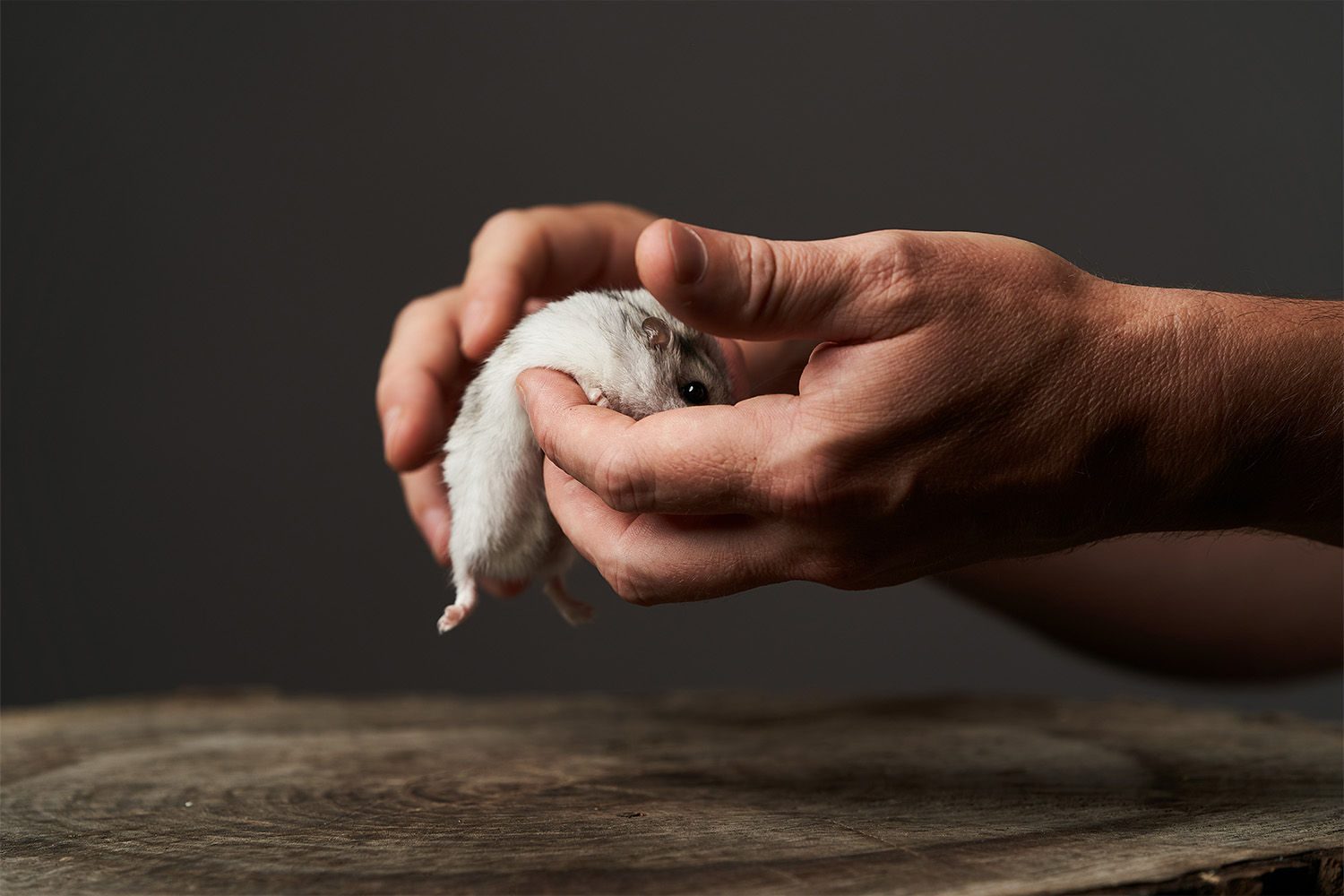While small and unassuming, a hamster can still protect itself if they feel the need to. This usually occurs as a small little nip when they are scared or uncomfortable, and it might not even hurt. Still, no one wants to be bitten by their hamster, and avoiding it altogether is the goal.
Don’t assume that your hamster hates you because they bite you — this isn’t always the case. Your hamster might bite you for various reasons, but there are ways to prevent it and gain your hamster’s trust.
In most cases, hamsters are known as very affectionate and cuddly little pets who like to run in circles on their wheels and snack on apples or sunflower seeds. You might need to put in the work to get your hamster to trust you, but once they do, you’ll have a great furry companion by your side (potentially keeping you up all night).
To learn more about why hamsters bite and how to prevent it, keep reading:
Why Do Hamsters Bite?
Hamsters aren’t known to be aggressive. They don’t randomly bite people to assert dominance, so if your hamster has bitten you, there is likely an underlying cause. Most of the reasons that a hamster would bite can be resolved with time and understanding.
You might not get results overnight, but if you take the time to learn what your hamster likes and dislikes, you can better protect yourself from being bitten and keep your hamster’s anxiety at ease.
They Are Afraid
If your hamster is new to you, they might be a bit fearful at first. Being in a strange new place can be overwhelming, even for these little guys, so fear is not abnormal.
If you dive right into trying to handle your hamster without letting them warm up to you, they might bite you. Hamsters need to get used to their space and familiarize themselves with your scent before they can become comfortable.
To prevent a bite, you need to recognize when your hamster is displaying signs of fear or irritation. This might look like them staring at you and diverting their gaze, searching for an escape route, or hiding in their cage from you. If your hamster is acting fearful or irritated, the best thing you can do is avoid handling them, so you don’t get bit.
Additionally, if your hamster is not comfortable with being held, the act alone might make them panic, and they might react by biting you. Unlike dogs, hamsters can’t bark like dogs as a warning — their fearful clues are more subtle.
They Are Hungry
Maybe your hamster isn’t scared of you but instead is beginning to get hungry, therefore slightly irritated. In people we call that “hangry,” we aren’t alone in that — hamsters feel it too.
This kind of bite might be more like a nibble and is a way of them letting you know it’s time to be fed. If your fingers smell like food, they will be even more likely to try to snack on them.
Due to this, it’s recommended that you wash your hands thoroughly before trying to handle your hamster. This way, they won’t mistake your fingers for carrots. While this might not be aggression, this kind of behavior is not ideal and should be stopped. By keeping to a strict feeding schedule, your hamster should not experience the need to bite.
They Want Some Alone Time
Sometimes your hamster will bite you because they don’t want any attention. If you’re handling them when they don’t want to be handled, they might become irritated and let you know to put them in their cage by biting you. Obviously, this isn’t ideal, but the best thing you can do is give your hamster space.
As you begin to form a closer bond with your hamster, you might begin to pick up on signs of this discomfort. You can avoid unwanted biting altogether by preemptively stopping it. Some hamsters simply aren’t going to want to be affectionate with you. Introverts are introverts, no matter the species.
Not all hamsters are overly friendly, and some like to live more solitary than others. You’ll learn these quirks about your hamster the more time you spend with them.
You Need To Adjust Your Handling Techniques
A bite from your hamster might signal that you need to be more gentle with them, especially if you are handling them. For your hamster, biting serves as a defense mechanism, and it helps them let you know they are feeling irritated by your behavior.
They might associate your handling of them with aggression, and their reaction will be to protect. You should never just grab your hamster without warning. Other people that might want to handle your hamster should take their time and go through all the same steps that you had to gain their trust. This will let your hamster feel more comfortable and less stressed when meeting new people.
They Smell Something Unfamiliar
We tell you to wash your hands before handling your hamster because unfamiliar smells might trigger them to bite. Whether they get spooked or assume your fingers are food, washing your hands can usually help prevent this. If you are a new person trying to interact with a hamster, they might bite simply because you smell different than their humans do.
Hamsters have exceptional senses of smell, so they know when a stranger is approaching them. If this stranger spooks your hamster, they might bite them in the name of self-defense. Until your hamster is comfortable with someone, they shouldn’t be handling them at all. The risk of a bite is much higher when the person is unfamiliar with your hamster.
How To Prevent Hamsters from Biting
Hamsters don’t bite because they are being aggressive towards you. They bite because they are scared or anxious. This means that you can work to prevent hamster bites in the future as long as you put in the effort to create a safe space for your hamster.
Some of the following tips can help you to get used to your hamster and learn their behaviors and needs. This will also allow time for your hamster to warm up to you and begin the process of trusting you.
Build Trust
Don’t rush your hamster into doing things they aren’t ready for. You shouldn’t handle them the first day that you get them more than you need to. Be patient with them, and they will come around to you. Hamsters are loving creatures but will need time to learn more about you and understand you’re a friend.
You can do this by sitting by their enclosure and talking to them, giving them an item of yours (like a sock) so they can get used to your smell, and let them settle into their new space.
If you have to pick them up (like in the case of an emergency) before your bond is strong, it is possible. Scoop them into a soft towel so that they don’t try to bite your hands.
Offer Treats
As pet parents, we’re not above bribes.
You can try to get your hamster to warm up to you by offering them some of their favorite snacks. With a new hamster, you will have to learn what they like to snack on before you shower them with treats (not literally, though, because treats should only be given in moderation). Your hamster’s nutrition is important and can help keep them healthy and confident.
Over time, by handing your hamster treats out of your hand, they should begin to open up and trust you more. Eventually, they might start to approach you on their own (yes, looking for a treat — but don’t complain!) and sniff your hand for longer each time without actually nibbling on it.
Pet Your Hamster With Care
Once your hamster is used to your smell, you can begin to pet them very gently. This might start with one or two fingers gently scratching their back and head rather than covering them with your whole hand.
If your hamster seems to tolerate the petting, then you can move on to the next step of picking them up. If they aren’t comfortable with you petting them yet, don’t move on to this next step, or you could weaken their trust.
Cares and Concerns
All hamsters are different and unique. They will like specific actions and dislike others. They might love getting their head or chin scratched but dislike being picked up. Maybe they want to crawl all over you and play with toys, but they become anxious the second you pet them. You can’t help what your hamster feels, but you can do your best to accommodate them.
Questions can arise, and sometimes you need specific answers based on your unique pet. With AskVet, you can ask your questions and get personalized responses quickly. If you are wondering about a behavior change in your hamster, you can chat with a Certified Pet Lifestyle Coach™ from AskVet to get answers and come up with behavioral plans.
If your hamster loves being pet and picked up but begins acting anxiously out of nowhere, there might be a cause for concern. Join Askvet and personalize your pet’s lifestyle plan today.
Sources:





